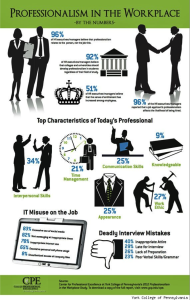Lauren Phillips – ENG-PWR & Creative Writing ’16
 Merriam-Webster defines professionalism as “the skill, good judgment, and polite behavior that is expected from a person who is trained to do a job well.”
Merriam-Webster defines professionalism as “the skill, good judgment, and polite behavior that is expected from a person who is trained to do a job well.”
My favorite part of this definition is that it says proper behavior is expected from a trained worker—the two don’t necessarily always go together. A person who learns how to do a job well doesn’t automatically gain appropriate behaviors to accompany those job skills, which is something many of us (myself included) could stand to remember. In modern workplaces, rules and standards have loosened (napping at work, anyone?), along with the barriers between work and home. People may be able to take their work home with them now, but that doesn’t mean they can bring their behaviors at home to work. Learning how to behave in a workplace can be as important as learning how to complete job-related tasks. Your boss won’t be impressed with your latest project if you swear a few times while presenting it.
There’s a place for every behavior, but your office probably isn’t the best place to share that joke you heard at the bar last weekend. Remember that you are a professional, and as such should act one. Interns should be even more mindful of this: you should want to impress your supervisors. Show them that you’re not just another college kid pretending to be a grown-up for the summer. Keep these 6 tips in mind, and you’ll be well on your way to impressing everyone in the office with your work and your attitude.
- Pay Attention
It may be difficult to focus on one person while your phone is buzzing with new tweets and there’s something happening behind her and you’re already thinking about lunch, but showing true interest in what someone has to say shows respect. Not only will you impress her, but you can also pick up a few new ideas, or even opportunities. If you’re having a hard time focusing on just one person, try these tips.
- Keep Private Things … Private
It’s okay to share some things, like an engagement or a family death, with your coworkers, but not everything qualifies as appropriate workplace conversation. Money, for example. Don’t mention your college debts or how much (or little, if you’re an intern) you make. It’s different if you work with your best friend, but if you’re just starting a new job or don’t know your coworkers very well, it’s best to stick to more casual conversations. Check out this list of topics it’s better not to mention.
- Dress Well
This may seem obvious, but, somehow, many people still forget how important appearances are. It may be superficial, but the fact is, people still judge others based on their appearances. This doesn’t mean you need big-screen worthy good looks and a wardrobe straight from the runway, but you should put some effort into your appearance. This includes ironing, knowing how to tie a tie (if applicable), and some sort of hairstyling. If you dress professionally, that’s one step closer to establishing professional behaviors.
- Watch Your Attitude
That may be something your parents used to tell you, but it holds true. A positive attitude shows you’re interested and engaged in what you’re doing. Your coworkers will be more likely to approach you with opportunities and for help, and people will like you more. Even if you’re having a bad day/week/month or you’re in a terrible mood, at least try to suppress those deep, boredom-induced sighs.
- Don’t Be Rude
Remember that you’re not the only person in the office, and that office etiquette matters. Even if you don’t know everyone by name, it never hurts to smile at the people you pass in the hallway or bump into in the break room. Also, be conscientious of the people around you. Keep your desk clean, avoid bringing bad-smelling foods in, and don’t blast your music. Behaving politely goes along with a good attitude: coworkers will like you more, and that can make a work experience ten times better.
- When in Rome …
Lastly, always be conscious of how your coworkers behave. If the office has a relaxed atmosphere, you probably don’t have to wear heels every day. Don’t add a “ma’am” or a “sir” onto the end of every sentence if no one else in the office is that polite. The key is to fit in. It’s always better to be overdressed than underdressed, but after a week or so in a new office, you should be able to judge how most people dress and behave. Mimic them, and you’ll be fine.
Professionalism isn’t a simple quality to achieve. The qualities that make one a professional can vary between industries or even between offices and are always adapting to match technological advancements. Still, it’s important to behave like you know what you’re doing. No one will depend on someone who has a bad attitude about his or her job, so if you want to move forward in your field, professionalism is the key.


 Follow
Follow
One Comment
I definitely agree with your tips. Maintaining a positive attitude is a very important part of being professional and likeable.